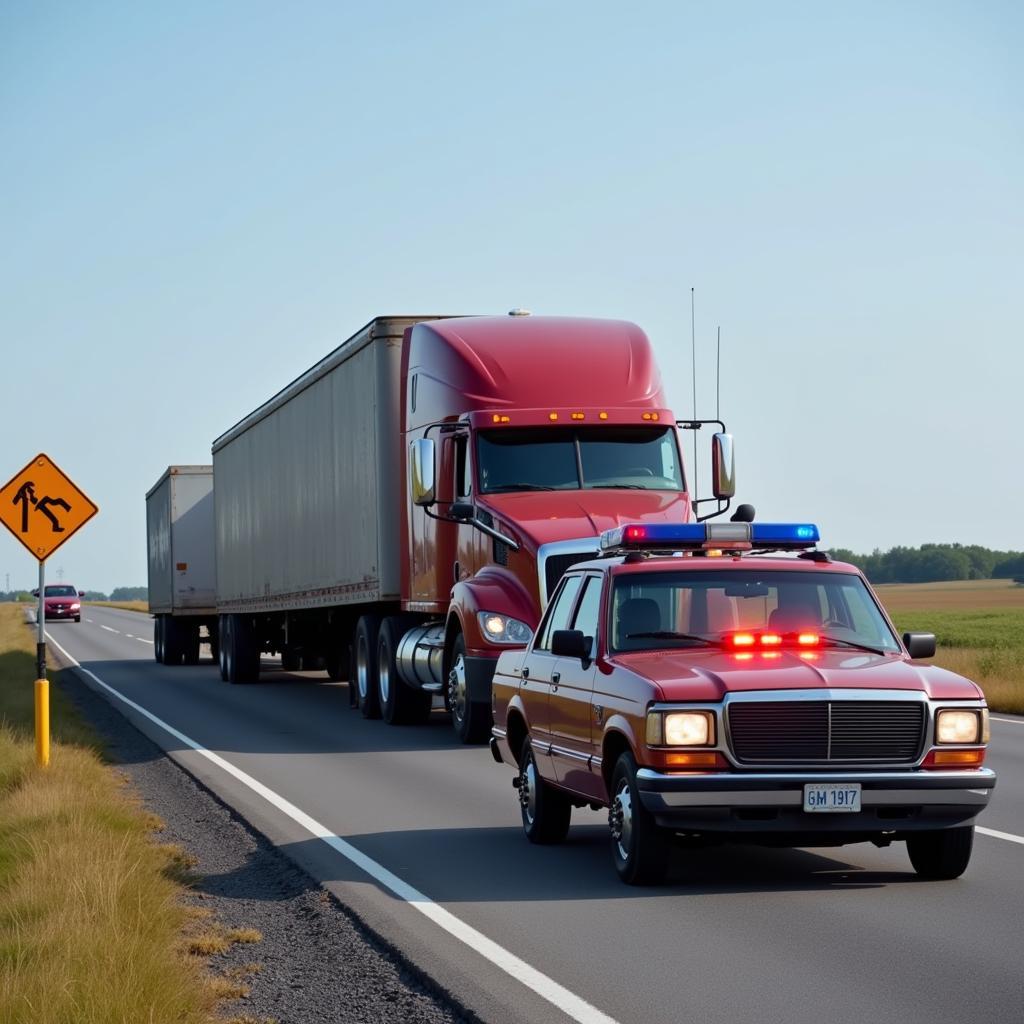What is Pilot Car Service?
Pilot car service is a specialized transportation service that ensures the safe and efficient movement of oversized or overweight loads over roadways. It involves using a pilot car, also known as an escort vehicle, to drive ahead of or behind the cargo to warn other motorists and guide the transport driver. This article will delve deeper into the intricacies of pilot car services, exploring their importance, benefits, and how they work.
 Pilot Car Escorting Truck
Pilot Car Escorting Truck
Understanding the Need for Pilot Cars
Transporting oversized loads presents a unique set of challenges due to their non-standard dimensions. These loads can pose risks to other vehicles, infrastructure, and even the load itself if not handled carefully. Pilot cars play a crucial role in mitigating these risks by:
- Enhancing Safety: Pilot car drivers are trained to identify potential hazards along the route, such as low bridges, narrow roads, or sharp turns. They communicate with the transport driver, providing warnings and guidance to prevent accidents.
- Improving Efficiency: By scouting the route and coordinating with traffic signals, pilot cars help ensure a smoother journey, minimizing delays and ensuring timely delivery.
- Complying with Regulations: Many jurisdictions mandate pilot car services for transporting cargo exceeding specific dimensions or weight limits. Pilot cars help trucking companies comply with these regulations, avoiding potential fines and legal issues.
How Pilot Car Services Work
The process of utilizing a pilot car service typically involves the following steps:
- Planning and Permitting: Before the transport, a detailed route survey is conducted to determine the need for pilot cars and obtain the necessary permits from relevant authorities.
- Pilot Car Selection: Based on the load’s size and the route’s complexity, the appropriate type and number of pilot cars are determined.
- Escorting the Load: On the day of transport, the pilot car drives ahead of or behind the cargo, maintaining a safe distance. They use flashing lights, warning signs, and communication systems to alert other drivers and guide the transport driver.
Types of Pilot Cars
Pilot cars come in various sizes and configurations to accommodate different load requirements. Some common types include:
- Single Pilot Cars: Used for smaller oversized loads that require basic guidance and traffic control.
- Lead and Trail Cars: For larger or more complex loads, a lead car guides the transport driver while a trail car follows behind, providing additional warning and protection.
- High Pole Vehicles: These specialized pilot cars have extended poles with lights and signs to provide advanced warning of overhead obstructions.
Benefits of Using Pilot Car Services
Partnering with a reputable pilot car service offers numerous advantages for companies transporting oversized loads:
- Reduced Risk of Accidents: Pilot cars significantly enhance safety by alerting other drivers and guiding the transport driver, minimizing the chances of collisions.
- Faster Transit Times: By ensuring a smoother journey and minimizing delays, pilot cars contribute to faster delivery times, saving time and money.
- Cost Savings: While pilot car services involve a cost, they can potentially save money in the long run by preventing accidents, damage to the load, or infrastructure, and avoiding fines for non-compliance.
- Peace of Mind: Knowing that experienced professionals are handling the safe transport of valuable cargo provides peace of mind to both the shipping company and the client.
When to Consider Pilot Car Services
Consider using a pilot car service if your load:
- Exceeds standard legal dimensions or weight limits.
- Requires travel on roads with low bridges, narrow lanes, or sharp turns.
- Needs to be transported during peak traffic hours.
- Is particularly valuable or time-sensitive.
Choosing the Right Pilot Car Service
When selecting a pilot car service, consider the following factors:
- Experience and Reputation: Choose a company with a proven track record of providing safe and reliable pilot car services.
- Area of Operation: Ensure the company covers your desired route and is familiar with the specific regulations in those areas.
- Communication and Technology: Look for a company that utilizes clear communication channels and advanced technology, such as GPS tracking and real-time updates.
- Insurance and Licensing: Verify that the company has adequate insurance coverage and all necessary licenses and permits to operate legally.
Conclusion
Pilot car services play a vital role in ensuring the safe and efficient transportation of oversized loads. By understanding the importance of pilot cars and choosing the right service provider, you can mitigate risks, ensure timely delivery, and maintain compliance with regulations. When it comes to moving oversized cargo, prioritizing safety and efficiency is paramount, and pilot car services are an invaluable asset in achieving these goals.
FAQ
1. How much does a pilot car service cost?
The cost of pilot car services varies depending on factors like distance, load size, route complexity, and the number of pilot cars required. It’s best to contact a pilot car service provider for a personalized quote.
2. What qualifications do pilot car drivers need?
Pilot car drivers typically require a commercial driver’s license (CDL) with the appropriate endorsements. They also undergo specialized training to learn about escorting oversized loads, traffic control procedures, and communication protocols.
3. Do I always need a pilot car for an oversized load?
Not always. The need for a pilot car depends on your load’s dimensions and weight and the specific regulations of the jurisdictions you’ll be traveling through. It’s essential to check with relevant authorities or consult a pilot car service provider to determine the requirements for your specific transport.
4. Can I be my own pilot car?
In some cases, using a personal vehicle as a pilot car might be permissible, but it’s crucial to verify the regulations in your area. Professional pilot car services often have more experience, specialized equipment, and insurance coverage, making them a safer and more reliable option.
5. How do I obtain permits for transporting an oversized load?
Permit requirements vary by jurisdiction. You’ll need to contact the relevant transportation authorities in each state or province your route crosses to apply for the necessary permits. Pilot car service providers can often assist with the permitting process.
Need help with your oversized load transport? Contact us today for expert pilot car services. WhatsApp: +1(641)206-8880, Email: [email protected]. Our 24/7 customer support team is here to assist you.

